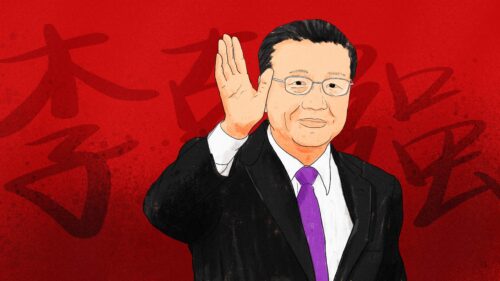This is the state of generative AI in China
...and today, Chinese state media 🖤 U.S.A. | September 20, 2023
| Dear reader:
The First American Volunteer Group of the Republic of China Air Force, a.k.a. the Flying Tigers, was a group of U.S. airmen who flew in support of the Chinese resistance against the Japanese invasion of China in 1941 and 1942. Whenever Chinese officials mention the Flying Tigers, it’s a sure sign that they want to talk to their American counterparts. Today that mention came right from Xí Jìnpíng 习近平. Scroll down to the News Briefing section for links. Our Word of the Day is: Generative artificial intelligence (生成式人工智能 shēngchéng shì réngōng zhìnéng).
|
 |
Jeremy Goldkorn
Editor-in-Chief
|
BUSINESS AND TECHNOLOGY
This is the state of generative AI in China |
 Illustration for The China Project by Derek Zheng Illustration for The China Project by Derek Zheng |
Generative AI fever is running high in China. Despite a particularly complex regulatory landscape, Chinese technology companies are racing to create and monetize the new type of artificial intelligence that has become all the rage in the tech world because of ChatGPT.
But even as the domestic regulatory train rolls forward, China’s AI industry leaders are not waiting for the government to take more measures or implement existing guidelines.
Read all about the state of China’s generative AI industry as seen by tech policy veterans Paul Triolo and Anarkalee Perera who have spent the past few months in deep conversation with Chinese tech industry leaders.
|
NEWS BRIEFING
|
|
| Here’s what else you need to know about China today:
Today Chinese state media 🖤 U.S.A.: Beijing is sending a very clear message with top stories on the People’s Daily front page and Xinhua News Agency’s website about Xí Jìnpíng 习近平 replying to a letter from Chairman of the Sino-American Aviation Heritage Foundation, an American NGO that commemorates the Flying Tigers, American military pilots who helped oppose the Japanese invasion of China from 1941 to 1942. Whenever Chinese officials mention the Flying Tigers, it’s a sure sign they want to talk to their American counterparts. This looks like a signal that Xi will after all attend the Asia-Pacific Economic Cooperation (APEC) meetings in the U.S. from November 15 to 17 this year. China made it easier for foreigners to apply for visas by reducing the amount of information needed to fill out the application forms, China’s Ministry of Foreign Affairs announced today. The new online application forms, which went live today, shorten the list of where a person has traveled from five years to one year, and require only the highest level of education that an applicant reached instead of a full history. The changes are part of a broader effort to lure tourists back into the country. “Applicants will spend much less time filling in the forms and expect a more streamlined visa application process,” the foreign ministry said in a statement. The ministry will always “facilitate people-to-people exchanges between China and foreign countries to promote China’s high-quality development and opening up.” Two tornadoes have left at least 10 people dead in the eastern province of Jiangsu. The first one in the city of Suqian killed five people and left four others severely injured, Chinese state media reported today. A second tornado in the evening left five people dead in Yancheng city, about 190 kilometers (120 miles) southeast of Suqian. China installed two ground stations on reefs in the disputed South China Sea as part of its BeiDou satellite navigation system, Chinese state television CCTV reported. The stations, which began operating on September 15, have been installed at lighthouses situated on North Reef and Bombay Reef in the Paracel Islands — territories that are also claimed by Vietnam and Taiwan. They are located strategically near an international sea route through the central area of the South China Sea, in what CCTV described as an effort to “serve as strong support” to help monitor ships and to assist ecological protection and ship navigation in one of the busiest waterways in the world. The U.S. has found no evidence that Huawei can produce smartphones with advanced semiconductors at scale, U.S. Commerce Secretary Gina Raimondo said yesterday. Speculation has swirled over Huawei’s ability to make its own advanced chips, after the Chinese tech giant rolled out its new Mate 60 Pro smartphone amid the sanctions the U.S. imposed since 2019 to curb its access to high-end chipmaking technologies. The Mate 60 Pro’s main chip, the Kirin 9000S, uses the 7-nanometer (nm) process designed by Huawei’s chip division HiSilicon and produced by China’s chipmaking giant SMIC. That means that Huawei has joined the ranks of an elite group of Big Tech companies, such as the U.S.’s Apple and Taiwan’s TSMC, that are able to make advanced semiconductors. Meanwhile, China accused the U.S. of infiltrating Huawei servers back in 2009 and continuously monitoring them, China’s Ministry of State Security said in a WeChat post yesterday. No germanium and gallium products left China in August, according to customs data, after the country in July imposed export curbs on the key metals used to make semiconductors and other electronics.
|
CHINA’S YOUTH GRAPPLE WITH A TOUGH JOB MARKET
My bosses made a bet that I would quit. I haven’t…yet |
 Illustration for The China Project by Maksym Filipenko Illustration for The China Project by Maksym Filipenko |
| China’s youth unemployment rate is soaring, and competition for good jobs is fiercer than ever. At the same time, young people are choosing to exit the rat race, to jump between jobs, or quit working altogether. What gives?
In this personal essay, Li Yijuan, a recent graduate from a top university in China, reflects on her job-searching journey and generational differences in work attitudes, arguing that the disconnected environment is caused by “mutual disloyalty.”
|
QUEER CHINA
Queer cinema in Hong Kong, before and after 1997: Q&A with Helen Hok-Sze Leung |
 Leslie Cheung and Tony Leung in Happy Together Leslie Cheung and Tony Leung in Happy Together |
| The Hong Kong Lesbian and Gay Film Festival has returned in full force after three years of pandemic-enforced restrictions and virtual programs. As one of the longest-running LGBTQ film festivals in Asia, the annual event has been a vital platform for the city’s LGBTQ community to advocate for visibility and acceptance through the lens of cinema.
Nathan Wei, author of the Queer China column, recently spoke to Dr. Helen Hok-Sze Leung, a professor at the Department of Gender, Sexuality, and Women’s Studies at Simon Fraser University in Canada, who has extensively researched queer cinema and Hong Kong culture. Click here to read the interview, which covers the history of queer cinema in Hong Kong before and after the 1997 handover, the close entanglement between queer expressions and popular culture, the impact of the National Security Law on the local film industry, and what it means to be “queer” during a time of uncertainty.
|
MORE FROM THE CHINA PROJECT
|
|
|
FROM THE NEWSBASE
Below are links from our NewsBase to other noteworthy reports published in the last 24 hours from and about China.BUSINESS AND TECHNOLOGY:Economic gloom or boom Local debt Foreign companies in China Semiconductor production Foreign ports used as intelligence-gathering outposts Electric vehicles Regulations for power post markets More flights between mainland and Hong Kong Huawei Huawei makes processor breakthrough in flagship smartphone / FT (paywall) SCIENCE, HEALTH, AND ENVIRONMENT:COVID-19 and lab leak theory Extreme weather Star systems Shenzhen wants Hong Kong tourists POLITICS AND FOREIGN AFFAIRS:China’s plan to assimilate Tibetans Opinion: The one million Tibetan children in China’s boarding schools / NYT (paywall) Xi’s common prosperity Public security BRI Hong Kong U.S.-China competition and tensions Huawei hacked U.S. spy bureau NSA ‘hacked Huawei HQ’: China confirms Snowden leak / SCMP (paywall) Japan Germany
Syria SOCIETY AND CULTURE:Asian Games Moutai’s boozy new venture
|
</table





